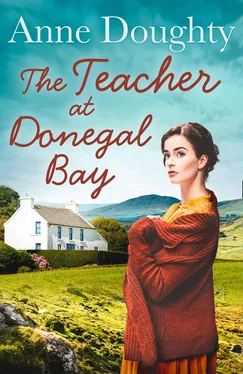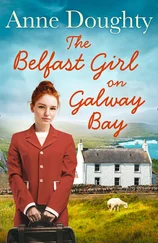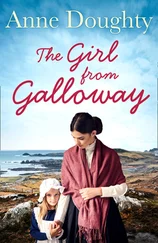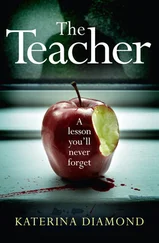1 ...6 7 8 10 11 12 ...17 ‘The door’s not locked, Daddy, but Lottie wouldn’t let me go in. She says there might be a ghost.’
The door had never had a lock. What was there to steal and who was there to steal it? Andy McTaggart had said it would make a storehouse for potatoes, but young Harry, always more practical, said it was too far away and not worth the carrying. So, after his mother died it had stood empty. He had removed her few possessions, put away the few pieces of delph as keepsakes for his brothers and sisters and planted fuchsias in the couple of three-legged pots which had survived.
He pushed open the door. He was surprised that there was no smell of damp, but then the back windows were broken and it was summer, the flagged stone floor was dry and only slightly dusty. Jenny walked in under his arm and stood regarding the empty hearth.
‘What’s that, Daddy?’ she asked, pointing her finger at the metal crane which still stood over the hearth, the chain dangling, untenanted over the absent fire. He saw flames spring up and shadows move and smelt the soda farls fresh from the griddle. It wasn’t all hard. There had been happiness in this place too. He knew now why his mother would not leave when he married in ’31. All the things she had loved were here. She had insisted firmly that she would stay and Mary McTaggart, ten years younger and now widowed herself had backed her up. Edna had said these old people can’t move with the times. It was better to let them alone.
‘Mmm, what’s that, love?’ he said, collecting himself and looking down again at the two bright eyes that regarded him unblinkingly.
‘Have you seen a ghost, Daddy?’ she said thoughtfully.
‘Perhaps I have, Jenny. It depends what you think a ghost is. Some people think ghosts are just what we remember inside our heads. I was remembering your Granny Erwin and your aunties and uncles in Scotland, and England, and America. I’ll tell you about them on the way home in the car if you’re a good girl. But we must go now. All right?’
‘All right, Daddy, but can I walk across the stepping stones all by myself?’
He hesitated. There was only a little water over the stones, hardly enough to wet his own shoes, but they were always slippery. She might fall and the boulders were rough in the stream bed. She could hit her head. How could he bear to lose this child, never to see those eyes again watching him, trusting, questioning. He felt tears mist his vision. What you love most you fear to lose. But you must face that fear or you destroy something of what you love. That was what his mother always said.
He nodded shortly and saw her run out of the cottage and across the rough grass. Before he had pulled the door behind him and opened his mouth to say a word of warning she was away and across. Standing on the far bank, a small, self-contained figure, she was waving to him.
‘Come on, Daddy, hurry up, you said it was time to go.’
He followed her cautiously and reached for her hand as she skipped along beside him.
Remember that, George. Let it be a lesson to you, he said silently to himself. Don’t ever try to put her in a cage to keep her safe, he added, as they moved together along the valleyside where the heather murmured and shook with the passionate harvesting of the bees . . .
George woke abruptly, the buzzing still in his ears. Pain oscillated in his chest. Suddenly the room seemed very warm. He leaned back in his chair, wiped beads of perspiration from his brow and thought longingly of the cool air of the glenside in the early morning, of the path he had walked with Jenny in his arms only moments ago in his dream.
The pain began to subside and his breathing became easier. He settled more comfortably in his chair. Lulled by the quiet, the warmth of the fire and the powerful drugs that dilated the arteries of his chest, he dozed off again. As the minutes of the long afternoon clicked past on the broad face of the clock on the mantelpiece, he moved far away in time and place.
The rain came in the night. It swept down the deep glen in soft grey curtains, catching fragments of light from the half-obscured moon. At first, the fine droplets slid over the summer dry grass, then, as the few dark hours of the short night passed, the thin soils became sodden and tiny rivulets began to trickle into the dry stream beds. By the time the sun rose and the sky cleared, the air was full of the splash of brown, peaty water as a dozen streams dashed headlong to the valley floor.
It was not the sudden bustle in the deep-cut watercourses that woke young George Erwin from his dream-filled sleep. It was the steady drip from the thatch and the bright dappling on the ceiling, where the sunlight reflected from the pools of water shimmering in the morning breeze on the swept stone flags outside the cottage. He lay, warm and still, only his eyes moving round the familiar features of his small, bare room.
The tiny window that looked south across the great trench-like hollow of the glen was spattered with raindrops and shadowed by the climbing rose his father had planted for his mother long ago. When he brought his young bride away from the comfortable, slate-roofed house where she had lived with her parents, and taught in the village school, she had come without regret, and made no complaint at the hardness of her new life, but down there, near the sea, where the soil was deep and had been worked for centuries, she’d had a garden and an orchard and he knew that she missed them. To comfort her for the loss of which she never spoke, he sent all the way to Antrim for a pink rose like the ones she had left behind.
Exposed to the strong wind on the valley sides and the thin soils of the crumbling basalt, it had struggled to get its roots down. Seeing its need, his father had collected soil from the lowland stream banks and manure from the farm where he laboured. He’d carried it up on his back and tended the young root with the same warm affection he offered to her and his children. The rose had flourished as their life had flourished. Now, when he was gone, it was his mother’s greatest joy. Apart from her children, all grown and gone away except for himself, there was nothing she loved more dearly than her climbing rose.
He could tell by the strength of the light and the shadow of the window thrown on the whitewashed wall that it was late. Usually by this hour he had milked the cow and searched for the eggs laid in strange places by the hens who had gone broody. Sometimes he would light the fire before he set off for school, or dig potatoes for their supper, or tether the goat in some new place where it had not already eaten all the meagre grass. Today there would be no time to do any of those tasks and he wondered why she had not called him an hour ago.
Just at that moment, she did call. A light, soft voice unmarked by the hardship of her life and the loss of so many she had loved.
‘Georgie. Time ye were up. It’s a grate mornin’.’
He jumped out of bed, poured water from the delph jug into the basin on the washstand, gave his face and hands a perfunctory wipe and pulled on his shirt and trousers. As he opened the door into the big, dark kitchen, he saw his mother was sitting outside. She was already at work. While she sat on one kitchen chair, another close by held her workbox and a pile of napkins. She was turned towards the light, her needle flying, her movements so fast he could hardly follow them. She heard him come, let the damask drop in her lap and reached up to kiss him.
‘How mony more?’ he asked, returning her kiss.
‘Seven forby. But ’tis early yet. He’ll not likely be here a while yet,’ she said, reassuring him. ‘Are ye weary the morn?’ she went on, looking at the droop of his shoulders and eyes filmed with sleep. ‘Ye were way late last night,’ she added gently.
Читать дальше












